Many people in 23 countries around the world view American technological achievements, entertainment, universities and military as the best in the world or above average among wealthy nations. Yet, people generally see the U.S. as similar to other wealthy nations on five societal measures tested in the survey: political stability, safety, democracy, religiosity and tolerance.
Even though roughly four-in-ten say the U.S. is about as politically stable as other wealthy countries, one-in-three see the U.S. as more politically stable, while a median of just 17% believe the U.S. is less politically stable.
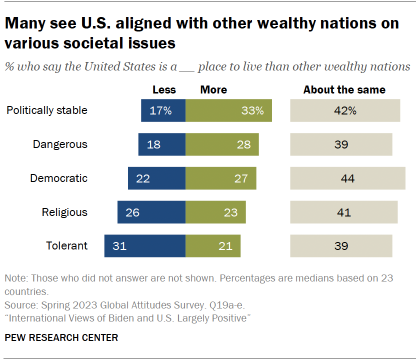
A similar pattern is present on the question of safety. A median of 39% think the U.S. is about as dangerous as comparable nations. However, a larger share says it is more dangerous than says it is less dangerous.
Many believe the U.S. aligns with other countries on democracy: A median of 44% say the U.S. is about as democratic as others, 27% believe it is more democratic and 22% believe it is less democratic. Roughly four-in-ten (41%) say the U.S. is about as religious as other wealthy countries, while 23% say the U.S. is more religious and 26% believe it is less religious.
A median of just under four-in-ten believe the U.S. is about as tolerant as other affluent nations, but a median of 31% say the country is less tolerant rather than more tolerant (21%).
How politically stable is the U.S.?
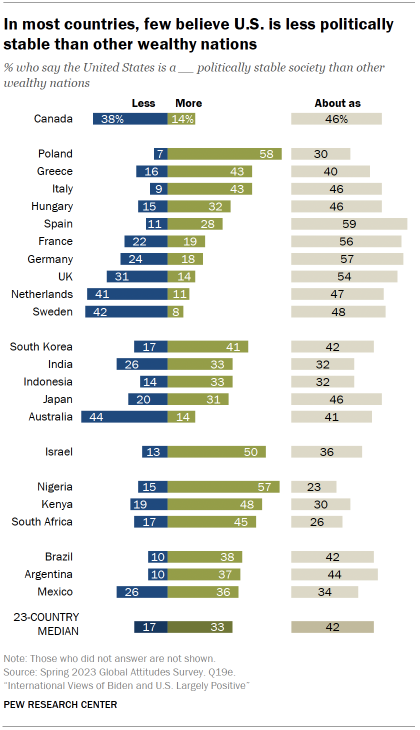
While the most common view is that the U.S. is about as politically stable as other wealthy nations, among those who think American political stability differs from the norm, large shares believe the U.S. is more politically stable than other prosperous countries. About half or more hold this view in Poland, Nigeria, Israel and Kenya.
Europeans hold mixed views on this issue. The share who say the U.S. is more stable ranges from just 8% in Sweden to 58% in Poland (the highest share to express this view in the survey).
Opinion in the Asia-Pacific region is also somewhat mixed. About four-in-ten in South Korea say the U.S. is more politically stable, as do about a third in India, Indonesia and Japan. Yet 44% of Australians believe the U.S. is less stable than similar countries. About four-in-ten say the U.S. is lessstable in Canada, the Netherlands and Sweden as well.
In some nations, people who place themselves on the ideological left are more likely than those on the ideological right to say the U.S. is less stable politically than other wealthy countries. For instance, 59% of Swedes on the left express this view, compared with 37% on the right. This pattern is also present in Australia, the UK, Canada, France, the Netherlands, Spain and South Korea.
How dangerous is the U.S.?
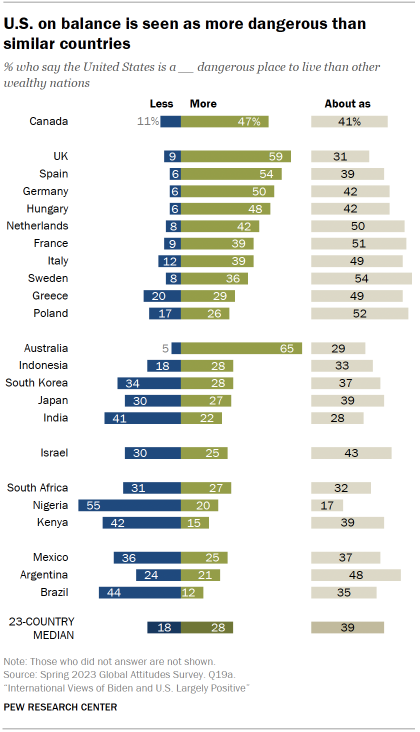
While a median of 39% say the U.S. is about as dangerous a place to live as other wealthy countries, those who believe differently are inclined to say it is more dangerous. For example, 47% of Canadians think the U.S. is a more dangerous place than comparable countries, while 11% say it is less dangerous.
Europeans are especially likely to believe the U.S. is unsafe. About half or more say the U.S. is more dangerous in Germany, Hungary, Spain and the UK.
A large majority – 65% – of Australians say the U.S. is more dangerous, while just 5% say it is less dangerous.
However, views are somewhat more mixed in the other Asia-Pacific nations surveyed. About a third in South Korea and 41% in India believe the U.S. is a less dangerous place.

Nigerians are particularly likely to say the U.S. is a less dangerous place to live than other wealthy nations.
In some nations, adults ages 18 to 39 are especially likely to say the U.S. is a more dangerous place to live than other wealthy nations. This is particularly the case in Europe. For example, 61% of younger people in the Netherlands say the U.S. is more dangerous, while just 34% of older people agree.
How democratic is the U.S.?
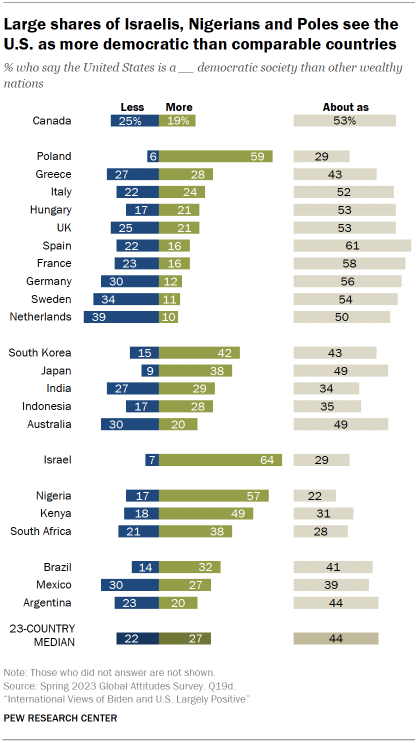
A median of 44% across the 23 nations polled believe the U.S. is about as democratic as other wealthy nations, while 27% say the U.S. is more democratic and 22% say it is less.
About half of Canadians think the U.S. is about as democratic as comparable countries. Slightly more say it is less democratic than say it is more democratic.
In Europe, Poles are particularly favorable toward the U.S. on this measure. Almost six-in-ten say the U.S. is more democratic than other affluent states, the highest share measured in the region. Elsewhere, no more than about a quarter believe the U.S. to be more democratic. And in Sweden and the Netherlands, about a third or more say the U.S. is less democratic.
Outside of Europe, assessments of U.S. democracy relative to other countries are generally positive, though Australians on balance say the U.S. is less democratic, and views in India are mixed.
About half or more in Kenya, Nigeria and Israel say the U.S. is more democratic than similar countries. And in South Africa, about four-in-ten say the same. Among those in Latin America, Brazilians are more inclined to see the U.S. as more democratic than comparable nations, while opinion is divided in Mexico and Argentina.
How religious is the U.S.?
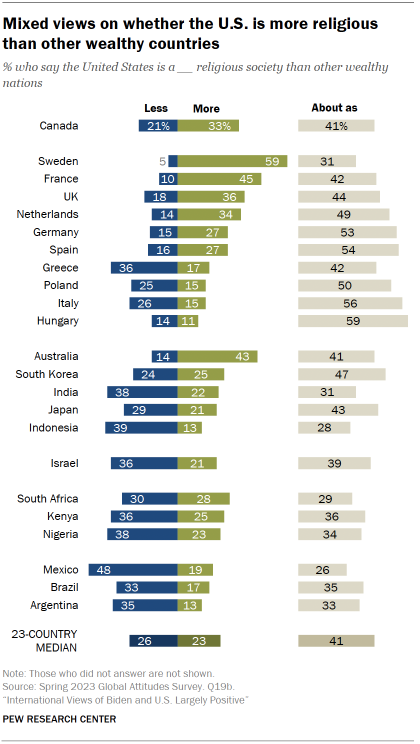
About four-in-ten of those surveyed – a median of 41% – believe the U.S. to be about as religious a place to live as other wealthy countries, while 26% say it is a less religious place, and 23% say it is a more religious place.
Notably, the U.S. generally stands out on religiosity compared with similarly advanced economies. In a recent survey, Americans have the highest share among the higher-income countries surveyed saying religion is important to them.
About a third of Canadians say the U.S. is more religious, while 21% say it is less.
Swedes are particularly prone to see the U.S. as more religious: 59% hold this view, the highest share across all countries polled. And about a third or more in France, the UK and the Netherlands see the U.S. as more religious. However, 36% of Greeks believe the U.S. is less religious than comparable countries, while just 17% say it is more religious.
Views in the Asia-Pacific region are mixed: About four-in-ten in India and Indonesia say the U.S. is less religious than other wealthy nations. However, in Australia, 43% believe the U.S. is a more religious place.
In Israel, those who think the U.S. differs from other wealthy countries are more inclined to say is it a less religious country than to say it is more religious.
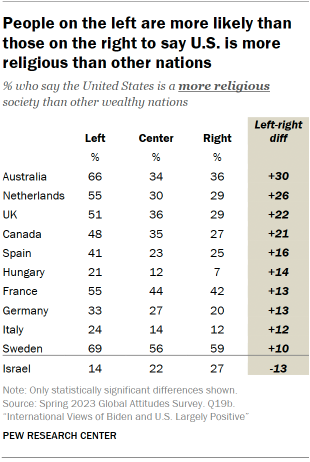
Just under a third of South Africans say the U.S. is less religious when measured against similar places, while 36% in Kenya and 38% in Nigeria say the same. Among Latin American countries, publics tend to say the U.S. is less religious.
In several countries, those who place themselves on the ideological left are more likely than those on the right to say the U.S. is a more religious place to live than other wealthy nations. In Australia, for example, 66% of those on the left hold this view, compared with only 36% of those on the right. This pattern holds across several European countries, such as the Netherlands, the UK and Spain, as well as Canada. However, in Israel, those on the right are more likely than those on the left to say the U.S. is more religious.
How tolerant is the U.S.?
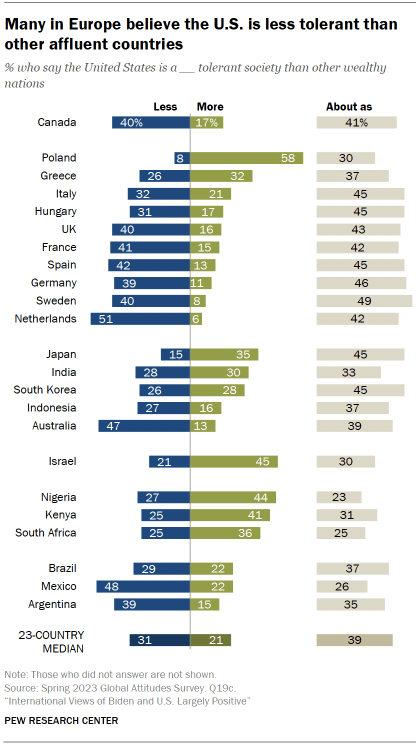
A median of 39% across 23 countries say the U.S. is about as tolerant a place to live as other wealthy nations. Those who say the U.S. differs from other wealthy nations tend to say it is a less tolerant place (a median of 31% hold this view). A median of 21% say the U.S. is a more tolerant place, with Poles especially likely to express this opinion.
In many European countries, about four-in-ten or more believe the U.S. is instead less tolerant than other prosperous countries, including 51% in the Netherlands.
Across the Asia-Pacific region, roughly a third in Japan and India say the U.S. is more tolerant, while 47% of Australians say it is less.
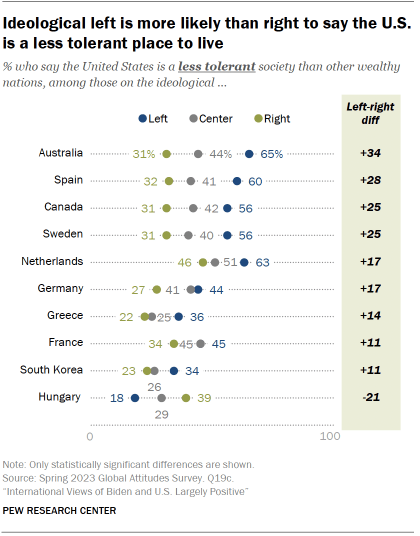
Pluralities in Nigeria, Kenya and South Africa say the U.S. is a more tolerant place to live compared with similar places, while in Latin America, public opinion leans toward the view that the U.S. is less tolerant.
In nine countries, people on the ideological left are more likely than those on the right to say the U.S. is a less tolerant place. For example, those on the left in Australia are more than twice as likely as those on the right to say the U.S. is less tolerant (65% vs. 31%, respectively). Double-digit differences are also present in Canada, most European countries surveyed and South Korea.
Ratings of American institutions, products and standard of living
We asked respondents to rate a variety of American products (such as technology, movies, music and TV) and institutions (such as the military and universities), as well as its standard of living. Generally, people consider them above average compared with other wealthy nations (in some countries, the data for this question comes from a 2021 survey – see table below).
Some countries surveyed have generally high assessments of U.S. soft power across the board. Roughly 80% or more of Israelis, Nigerians and Poles say the U.S. is the best or above average on every question asked. Ratings in Kenya and South Africa are consistently high for the different aspects of American society we measured.
On the other end of the spectrum, and despite generally positive ratings of the U.S. overall, Germans tend to have the least positive ratings of American institutions and products.
People most commonly rate American technological achievements as above average (a median of 72% across the 23 countries polled). A median of 20% say American technological achievements are average. Only 4% believe they are below average or the worst, compared with other wealthy nations.
Roughly half or more in every country, and a median of 71%, say American movies, television and music are above average. Adults under 40 are more likely than those ages 40 and older to see American entertainment as exceptional in most of the countries surveyed. Yet even among people ages 40 and older, most say American television, movies and music are above average.
Meanwhile, a median of 19% say U.S. popular culture is average and 5% say it is below average or the worst. India, home to Bollywood, stands out for having the highest share of adults who consider American movies, television and music below average or the worst (20%). The share who hold this view in most other countries is in the single digits.
A median of 69% across the 23 countries surveyed rate American universities highly. And in Kenya, South Africa, Nigeria, India, Brazil and Israel, at least half say colleges in the U.S. are the best compared with other wealthy nations.
Again, a median of 20% say colleges in the U.S. are average and 5% say they are below average or the worst compared with other wealthy nations.
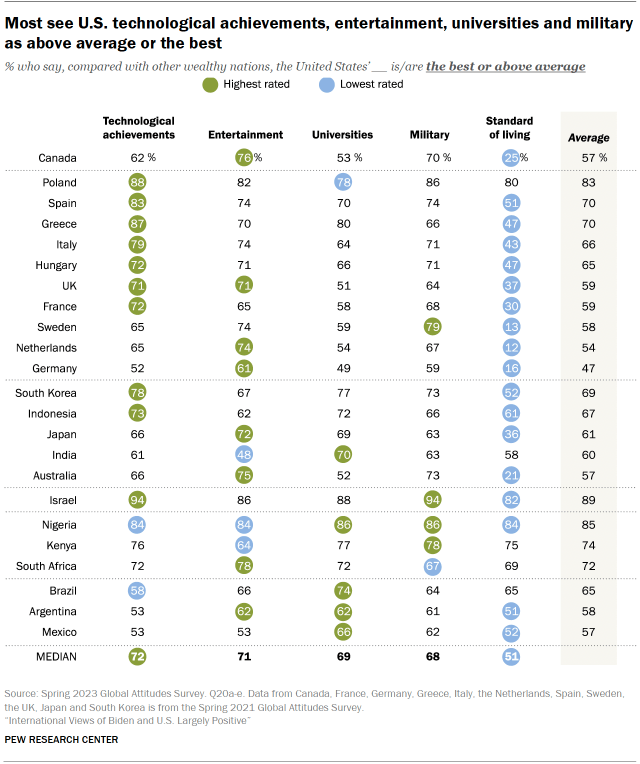
Majorities in every country surveyed, with a median of 68%, rate the U.S. military as above average or the best. People in Israel, Sweden, Nigeria and Kenya are especially likely to rate the U.S. military highly, compared with other aspects of American society. A large majority of Poles agree, though the military falls just below ratings of American technology in Poland. Very few rate the U.S. military as average (a median of 18%) or below average (a median of 6%) across the countries surveyed.
Compared with American institutions and products, fewer say the standard of living in the U.S. is better than average. Just around half hold this view across the countries surveyed. And in nearly every country, the U.S. standard of living receives lower ratings than the other four aspects of America’s image we asked about.
There is some variability in responses to this question, though. In Nigeria, Israel, Poland and Kenya, 75% or more say the standard of living in the U.S. is above average or the best when compared with other wealthy nations. Yet around 20% or less agree in Australia, Germany, Sweden and the Netherlands.
Across all 23 countries surveyed, a median of 35% say the standard of living in the U.S. is average and 13% say it is below average or the worst.




